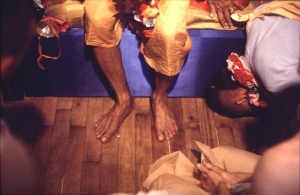CC Madhya 24.54 (1975): Difference between revisions
(Vanibot #0027: CCMirror - Mirror CC's 1996 edition to form a basis for 1975) |
(Vanibot #0020: VersionCompareLinker - added a link to the Version Compare feature) |
||
| Line 2: | Line 2: | ||
<div style="float:left">'''[[Sri Caitanya-caritamrta (1975)|Śrī Caitanya-caritāmṛta (1975)]] - [[CC Madhya (1975)|Madhya-līlā]] - [[CC Madhya 24 (1975)|Chapter 24: The Sixty-One Explanations of the Atmārāma Verse]]'''</div> | <div style="float:left">'''[[Sri Caitanya-caritamrta (1975)|Śrī Caitanya-caritāmṛta (1975)]] - [[CC Madhya (1975)|Madhya-līlā]] - [[CC Madhya 24 (1975)|Chapter 24: The Sixty-One Explanations of the Atmārāma Verse]]'''</div> | ||
<div style="float:right">[[File:Go-previous.png|link=CC Madhya 24.53 (1975)|Madhya-līlā 24.53]] '''[[CC Madhya 24.53 (1975)|Madhya-līlā 24.53]] - [[CC Madhya 24.55 (1975)|Madhya-līlā 24.55]]''' [[File:Go-next.png|link=CC Madhya 24.55 (1975)|Madhya-līlā 24.55]]</div> | <div style="float:right">[[File:Go-previous.png|link=CC Madhya 24.53 (1975)|Madhya-līlā 24.53]] '''[[CC Madhya 24.53 (1975)|Madhya-līlā 24.53]] - [[CC Madhya 24.55 (1975)|Madhya-līlā 24.55]]''' [[File:Go-next.png|link=CC Madhya 24.55 (1975)|Madhya-līlā 24.55]]</div> | ||
{{CompareVersions|CC|Madhya 24.54|CC 1975|CC 1996}} | |||
{{RandomImage}} | {{RandomImage}} | ||
==== TEXT 54 ==== | ==== TEXT 54 ==== | ||
<div class="verse"> | <div class="verse"> | ||
:kasyānubhāvo | :kasyānubhāvo 'sya na deva vidmahe | ||
:tavāṅghri-reṇu-sparaśādhikāraḥ | :tavāṅghri-reṇu-sparaśādhikāraḥ | ||
:yad-vāñchayā śrīr lalanācarat tapo | :yad-vāñchayā śrīr lalanācarat tapo | ||
:vihāya kāmān | :vihāya kāmān suciraṁ dhṛta-vratā | ||
</div> | </div> | ||
| Line 20: | Line 19: | ||
<div class="synonyms"> | <div class="synonyms"> | ||
kasya—of what; anubhāvaḥ—a result; asya—of the serpent (Kāliya); na—not; deva—O Lord; vidmahe—we know; tava-aṅghri—of Your lotus feet; reṇu—of the dust; sparaśa—for touching; adhikāraḥ—qualification; yat—which; vāñchayā—by desiring; śrīḥ—the goddess of fortune; lalanā—the topmost woman; acarat—performed; tapaḥ—austerity; vihāya—giving up; kāmān—all desires; | kasya—of what; anubhāvaḥ—a result; asya—of the serpent (Kāliya); na—not; deva—O Lord; vidmahe—we know; tava-aṅghri—of Your lotus feet; reṇu—of the dust; sparaśa—for touching; adhikāraḥ—qualification; yat—which; vāñchayā—by desiring; śrīḥ—the goddess of fortune; lalanā—the topmost woman; acarat—performed; tapaḥ—austerity; vihāya—giving up; kāmān—all desires; suciram—for a long time; dhṛta—a law upheld; vratā—as a vow. | ||
</div> | </div> | ||
| Line 27: | Line 26: | ||
<div class="translation"> | <div class="translation"> | ||
" 'O Lord, we do not know how the serpent Kāliya attained such an opportunity to be touched by the dust of Your lotus feet. For this end, the goddess of fortune performed austerities for centuries, giving up all other desires and taking austere vows. Indeed, we do not know how this serpent Kāliya got such an opportunity.' | |||
</div> | </div> | ||
| Line 34: | Line 33: | ||
<div class="purport"> | <div class="purport"> | ||
This verse from Śrīmad-Bhāgavatam ( | This verse from Śrīmad-Bhāgavatam (10.16.36) was spoken by the wives of the Kāliya demon. | ||
</div> | </div> | ||
Latest revision as of 15:52, 27 January 2020

A.C. Bhaktivedanta Swami Prabhupada
TEXT 54
- kasyānubhāvo 'sya na deva vidmahe
- tavāṅghri-reṇu-sparaśādhikāraḥ
- yad-vāñchayā śrīr lalanācarat tapo
- vihāya kāmān suciraṁ dhṛta-vratā
SYNONYMS
kasya—of what; anubhāvaḥ—a result; asya—of the serpent (Kāliya); na—not; deva—O Lord; vidmahe—we know; tava-aṅghri—of Your lotus feet; reṇu—of the dust; sparaśa—for touching; adhikāraḥ—qualification; yat—which; vāñchayā—by desiring; śrīḥ—the goddess of fortune; lalanā—the topmost woman; acarat—performed; tapaḥ—austerity; vihāya—giving up; kāmān—all desires; suciram—for a long time; dhṛta—a law upheld; vratā—as a vow.
TRANSLATION
" 'O Lord, we do not know how the serpent Kāliya attained such an opportunity to be touched by the dust of Your lotus feet. For this end, the goddess of fortune performed austerities for centuries, giving up all other desires and taking austere vows. Indeed, we do not know how this serpent Kāliya got such an opportunity.'
PURPORT
This verse from Śrīmad-Bhāgavatam (10.16.36) was spoken by the wives of the Kāliya demon.